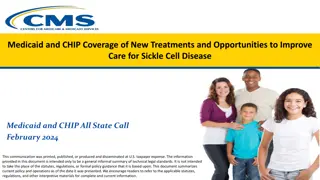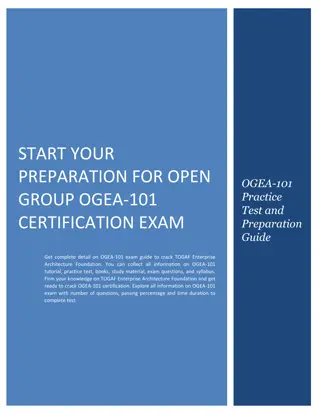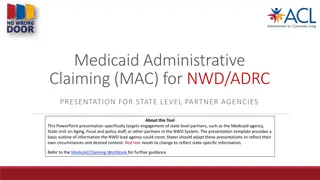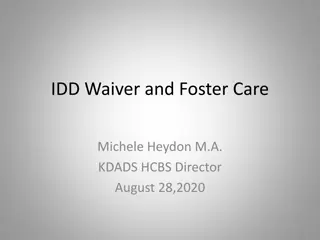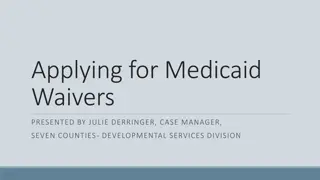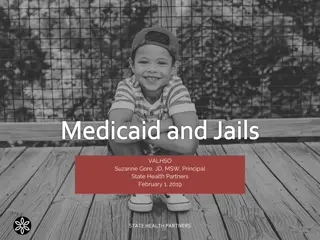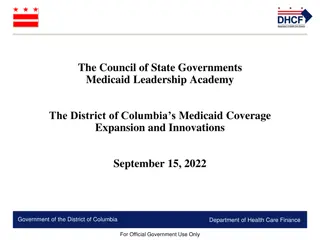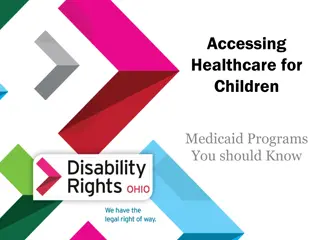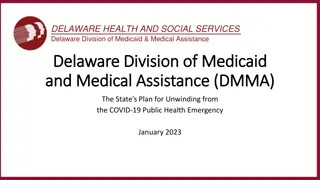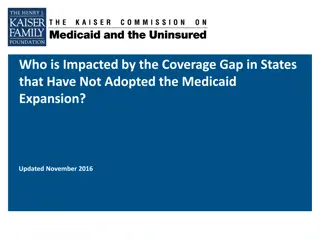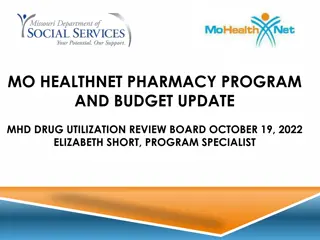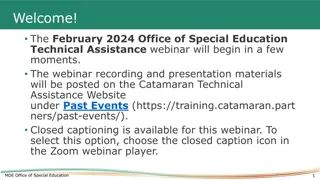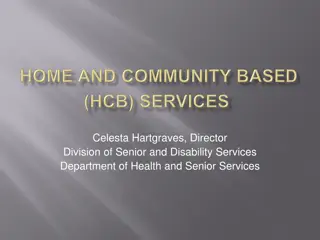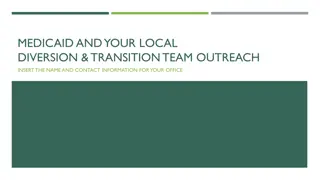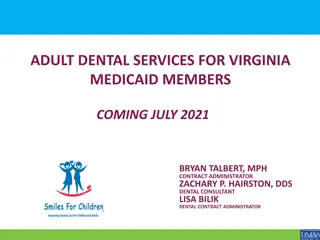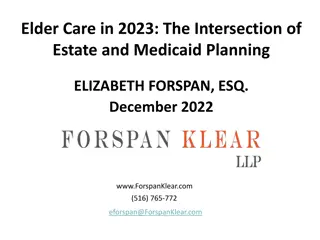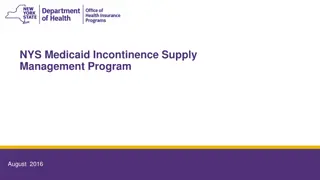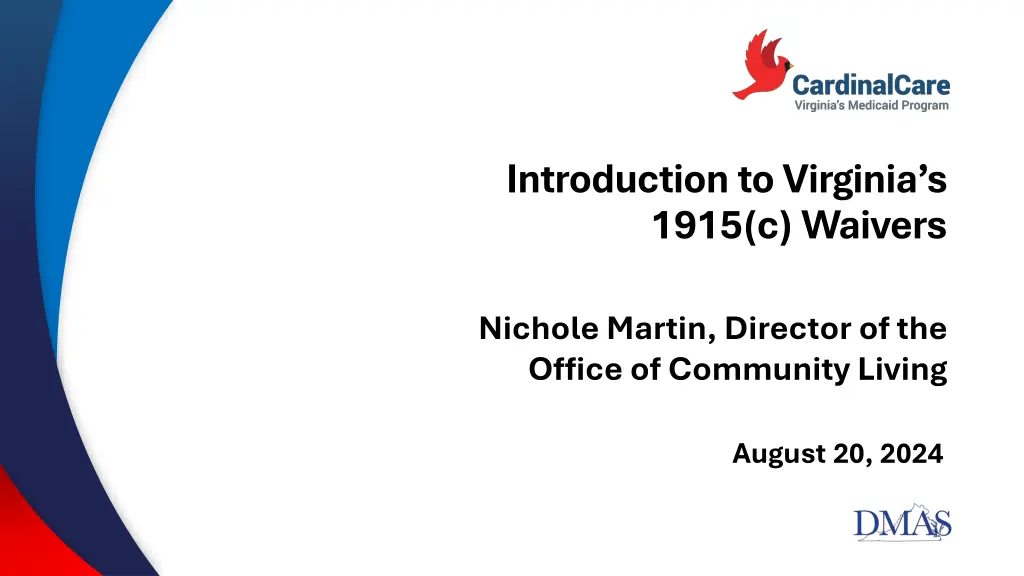
Understanding Virginia's 1915(c) Waivers for Home and Community-Based Services
Learn about Virginia's 1915(c) Waivers, which allow individuals to receive long-term services and supports at home or in the community instead of in an institutional setting. Discover the waiver requirements, eligibility criteria, waiver life cycle, and the specific 1915(c) waivers offered in Virginia, such as the Commonwealth Coordinated Care Plus (CCC Plus) Waiver.
Download Presentation

Please find below an Image/Link to download the presentation.
The content on the website is provided AS IS for your information and personal use only. It may not be sold, licensed, or shared on other websites without obtaining consent from the author. If you encounter any issues during the download, it is possible that the publisher has removed the file from their server.
You are allowed to download the files provided on this website for personal or commercial use, subject to the condition that they are used lawfully. All files are the property of their respective owners.
The content on the website is provided AS IS for your information and personal use only. It may not be sold, licensed, or shared on other websites without obtaining consent from the author.
E N D
Presentation Transcript
Introduction to Virginias 1915(c) Waivers Nichole Martin, Director of the Office of Community Living August 20, 2024
What are 1915(c) waivers? Home and Community-Based Services (HCBS) waivers allow individuals to receive long-term services and supports at home or in the community rather than an institutional setting. 1915(c) of the Social Security Act enables states to ask for "waivers" to normal Medicaid rules to allow HCBS to be provided to targeted groups. Waivers can waive : Statewideness Comparability of Services Income and resource rules Limits to a particular diagnosis or diagnoses Waiver services must be more cost-effective than services in an institution. 2
1915(c) Waiver Requirements States must demonstrate to the Centers for Medicare and Medicaid Services (CMS) that the waivers meet certain requirements 3
Home and Community Based Settings Rule In 2014, CMS finalized the Home and Community Based Services (HCBS) Settings Regulations (often called the HCBS Rule). Virginia anticipates that all waiver funded settings will be in full compliance by the end of 2025. The crux of the rule is that CMS intends to ensure that individuals receiving services and supports through Medicaid s HCBS programs have full access to the benefits of community living and are able to receive services in the most integrated setting. Virginia's CMS Approved Statewide Transition Plan: Statewide Transition Plans | Medicaid DMAS hosts on their website an HCBS Toolkitfor providers seeking clarification and resources on elements of compliance with the rule. 4
How is an individual eligible for a 1915(c) waiver? Medicaid Eligible (Medicaid Application for Financial and Non-Financial Criteria) Waiver Eligible Meet Criteria for Institutional Level of Care (LTSS Screening or VIDES Screening) 5
Waiver Life Cycle State submits waiver application to CMS State submits waiver amendments as needed State submits waiver renewal (5 years in Virginia) 6
Virginia has four 1915(c) waivers Commonwealth Coordinated Care Plus (CCC Plus) Waiver Alternative Institution: Nursing Facility (NF), specialized care facility, or long-stay hospital Covered populations: Older adults (65 and older) Individuals who have a physical disability Individuals who are chronically ill or severely impaired, having experienced loss of a vital body function, and who require substantial and ongoing skilled nursing care. No waitlist Waiver has combined 1915(b)/1915(c) authority: individuals can receive waiver services either through fee-for-service or through managed care Developmental Disability Waivers Names of the Waivers: Building Independence (BI) Community Living (CL) Family and Individual Supports (FIS) Alternative Institution: ICF/IID For persons with a diagnosis of an intellectual and/or developmental disability Waivers have a limited number of "slots" All waiver services are fee-for-service 7
How to Access CCC Plus Waiver Services Individuals are assessed to determine if they meet the nursing facility level of care Local Departments of Health & Social Service Program of All-Inclusive Care (PACE) Community Hospital Hospital Discharge Planner or Social Worker NF Nurse and Social Worker For members receiving skilled rehabilitation services Nursing Facility (NF) 8
Total LTSS Screenings CY23 Total Screenings Conducted: 45,819 LTSS Screening Approvals and Denials 50,000 45,000 40,000 35,000 30,000 25,000 20,000 15,000 10,000 5,000 0 Communty Based 6,976 16,414 Hospitals 19,493 20,295 Nursing Facility 60 2,074 Overall 7,838 37,981 Denied Approved Approved Denied 9
CCC Plus Waiver Delivered through managed care (except for exempt populations) 1915b/c waiver authority Waiver Criteria Functional capacity needs the degree of assistance needed to complete activities of daily living (ADLs) such as bathing, dressing, toileting, and eating. Mobility and behavioral needs are also considered Needs are rated as either independent, semi- dependent, dependent, mechanical help or requiring human help Functional Need criteria is met when rated as one of the following is met: Rated dependent in two to four of the ADLs, and also rated semi-dependent or dependent in Behavior Pattern and Orientation, and semi-dependent or dependent in Joint Motion or dependent in Medication Administration. Rated dependent in five to seven of the ADLs, and also rated dependent in Mobility. Rated semi-dependent or dependent in two to seven of the ADLs, and also rated dependent in Mobility and Behavior Pattern and Orientation. Must have a medical or nursing need Must be at risk for institutionalization within 30 days 10
Applying for DD Waivers To apply for a Developmental Disability Waiver slot, contact the local Community Services Board. The Community Services Board (CSB) staff willdetermine if you: Meet Virginia sDefinition of Developmental Disability. (Diagnostic Eligibility) Meet the functional criteria for the VA Individual Developmental Disability Eligibility Survey (VIDES) Do not have to be financially eligible while on the DD waiver waitlist. The individual must meet financial eligibility once a waiver slot is assigned. This will be determined by the local Department of Social Services. Be willing to accept services within 30 days of slot assignment. 12
Virginia'sThree Waivers for People with Developmental Disabilities 13
DD Waiver Slot Allocation Process DMAS submits waiver amendments to CMS GA approves DD waiver slots CMS approves waiver slots CSB contacts Waiver Slot Assignment Committee for slot assignment DBHDS assigns slots to CSB s CSB determines which individuals 14
DD Waivers Waitlist Total Waiver Slots* Over 18,000 Total Waiver Waitlist* Over 15,000 Priority One Over 3600 Currently, waiver Slots are only assigned to those with priority one status to ensure those most in need access services first. Legislative session passed budget for 3400 newDD waiver slots to eliminate most of the priority one waitlist. Priority Two Over 6500 Priority Three Over 5000 *Approximation as of 08/01/2024 15
Developmental Disabilities Waiver Services Part 1 BI X X FIS X X X X X X CL X X X X X X Employment and Day Options Individual Supported Employment Group Supported Employment Workplace Assistance Community Engagement Community Coaching Group Day Support BI X X FIS CL Residential Options Independent Living Supports Shared Living In-Home Supports Supported Living Group Home Residential Sponsored Residential X X X X X X X X X X X BI FIS X X X X CL X X X X Consumer Directed/Agency Directed Options Service Facilitation (For CD Services) Companion Personal Assistance Services Respite 16
Developmental Disabilities Waiver Services Part 2 BI X X X X FIS X X X X X X X CL X X X X Additional Options Assistive Technology Benefits Planning Community Guide Electronic Home-Based Services Individual and Family/Caregiver Training Environmental Modifications Employment and Community Transportation Peer Mentor Supports Transition Services BI FIS CL Crisis Support Options X X X Center Based Crisis Supports X X X Community-Based Crisis Supports X X X Crisis Support Services BI FIS X X X X CL X X X X Medical and Behavioral Supports Private Duty Nursing Skilled Nursing Therapeutic Consultation Personal Emergency Response System (PERS) X X X X X X X X X X X 17
Spotlight on Personal Care Services Provides support to members for activities of daily living Agency or Consumer Directed FY 23 over 50,000 unique members received personal care Legally responsible individuals (parents of minors and spouses) can serve as the attendants and receive reimbursement for up to 40 hours per week 18
Agency Directed vs Consumer Directed Personal Care FY '23 Expenditures FY '23 Members 48% 52% AD Service CD Service 46% 54% AD Services CD Services 20
1915(c) Waiver: Legally Responsible Individuals (LRI) What does this mean in terms of Medicaid? LRI are normally prohibited from being paid to provide Medicaid- reimbursed services. One exception: 42 CFR 440.167 Personal care services States may apply for a waiver from this restriction Applies ONLY to Home and Community-Based Services Waivers Still not allowed in EPSDT, Medicaid Works Still not allowed in non-personal care services (nursing, habilitation services, community integration services) Who is a legally responsible individual? A legally responsible individual is someone who has a legal responsibility to provide care to a loved one. By its definition, a LRI is a primary caregiver. In Virginia, there are two groups: parents/legal guardians of minor children and spouses. Does not apply to: Parents of adult children Grandparents Siblings Aunts, uncles, cousins, nieces, nephews 21
1915(c) Waiver Initiatives: Electronic Visit Verification (EVV) What is EVV? Required under the 21st Century CURES Act Agency-directed and Consumer-Directed Personal Care/Assistance, Respite, and Companion Meant to ensure Medicaid payments are being made for services rendered It became required as of September 1, 2020 Live-in aides and attendants are exempt per the General Assembly Personal care agencies use their own EVV system Consumer-directed attendants download EVV app owned by the Fiscal-Employer Agent Attendants can use the web portal for situations when EVV cannot be done (app not working, unable to access the app) The Office of Community Living is currently reviewing reports of Consumer- Directed attendants who are not using the EVV method and developing methods to increase compliance with this federal requirement 22
Waiver Service Expenditures (FY2023) CCC+ Waiver Approximately 49,000 members Average cost per member = $32,000 Total Paid = Approximately $1.6 Billion DD Waivers Approximately 16,000 members Average cost per member = $105,000 Total Paid = Approximately $1.7 Billion Ages Served Approximately 9,000 members age 20 and under Approximately 40,000 members age 21 and over Ages Served Approximately 2,000 members age 20 and under Approximately 14,000 members age 21 and over 23
Waiver Cost Effectiveness (FY 22) CCC Plus Community Living Family and Individual Supports $63,945 Building Independence Waiver+ Acute Care Costs per member Institutional + Acute Care Costs per member $41,727 $111,493 $29,870 $51,916 $250,947 $250,947 $250,947 CMS 372- Annual Report on Home and Community Based Services Waivers 24


